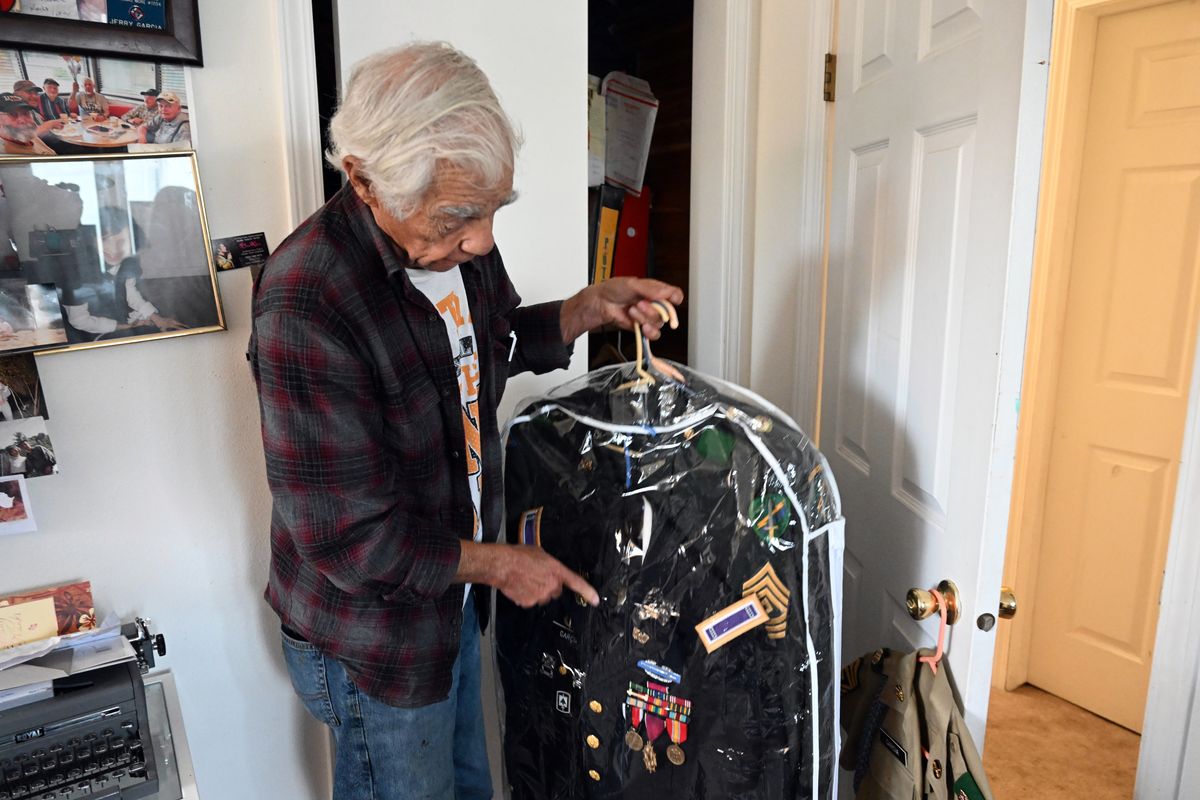Spokane veteran and his five brothers have all served in the military, some as early as 1941

Throughout his military career, Spokane’s Gerald “Jerry” Garcia told no one he had technically lied about his age to his recruitment officer.
“You guys are 18, aren’t you?” the officer had asked Garcia and his two companions.
The 16-year-old only nodded.
“I didn’t say anything,” Garcia recalled.
Of the trio of teenage boys, only Garcia passed the Army’s physical exam. He later found out his two buddies had intentionally flunked the assessment.
Garcia, now 89, enlisted in the Army in 1950. He was spurred by a youthful ambition to become a soldier in the Korean War.
Yet in his 44 years of service, Garcia never saw combat. Though he was stationed in Europe a few times, he spent most of his time doing administrative and supply work for the Army back home.
“I asked a couple times, you know, let me get overseas,” Garcia said. But it never happened.
Military service could be seen as a tradition in Garcia’s family – he has numerous veteran relatives that span three generations.
Garcia’s mother had 12 children.
“There were six boys and there were six girls,” Garcia said. The names of every one of them started with G.
“Gilbert, George, Gene, Grant … I don’t know how my mother learned all those names,” Garcia said.
Each of his brothers spent time in the armed forces at some point.
Gilbert, the oldest, joined the Navy in December 1941 following the Japanese invasion of Pearl Harbor.
“He was in there for six years,” Garcia said.
The following year, Garcia’s brother George turned 18 and joined the Marine Corps. His brother Gene enlisted after that. The pattern continued.
“My turn came up, and I joined at 16. But then, you know, nobody knew that right? Nobody mentioned it.”
One of Garcia’s younger brothers, Grant, spent four years in the Marine Corps. His entire life, he refused to speak of his time overseas.
“Grant was stationed in India for a while. … When he came back, he was a little different guy,” Garcia said.
Only two of Garcia’s siblings, Greg and Gilda, are still alive. Garcia is surprised he has lived as long as he has.
“I can’t figure out why I’m still here, but I’m appreciative,” Garcia said. “I don’t know why the Lord smiled down on me.”
He and his brothers weren’t the first or the last of the family to serve in the military.
Garcia’s uncle Bill served in World War II. Like Garcia’s brother Grant, he wasn’t the same person when he returned.
“Something must have happened to him back there in Germany,” Garcia said.
Garcia remembers playing in the lawn outside at about 10 years old while his uncle mowed.
One day, Bill “picked up the lawnmower and held it up like this,” Garcia said, standing with his knees bent and fists shaking in the air. “I remember him shaking and hollering.”
Garcia ran to find his father.
“I said, ‘Uncle Bill’s doing something wrong. What’s wrong with him?’ ”
Bill had severe PTSD and died that day from a heart attack.
Garcia married elementary school teacher Marlys Lippsmeyer in 1958. The couple went on to have four children: Scott, Steve, David and Maura Lia.
In 1966, Lippsmeyer considered enlisting in the Army Reserve Medical Service but declined her commission when 7-year-old Steve was hospitalized for leukemia.
Steve fully recovered from the cancer.
Scott, Garcia and Lippsmeyer’s youngest son, was stationed in the Middle East for a few years in the ’80s.
Steve’s daughter and Garcia’s granddaughter Terah spent some time in the Navy reserve.
Though Garcia had already retired at that point, he dressed in uniform to swear her in.
“All the soldiers in the gym stood at attention immediately, right when he walked in,” she reminisced.
After 44 years in the Army, Garcia left in 1994 at age 60.
He lost his son David in 2003 to a head injury, and his wife in 2011 to chronic obstructive pulmonary disease, a lung disease that causes breathing problems.
During his time in the military, Garcia said he received “commendation after commendation after commendation,” as well as “an enormous amount of appreciation notes.”
“I’ve had good times in the military,” Garcia said. “I appreciate the thing that I learned from the army – I learned how to respect other people.”
Terah also values Garcia’s time in the armed forces.
“I’m very proud of his service” she said. “(It’s) an honor to have him in my life and just see the service that he provided. A lot of people don’t stay as long as he did, and that showed a lot of commitment.”